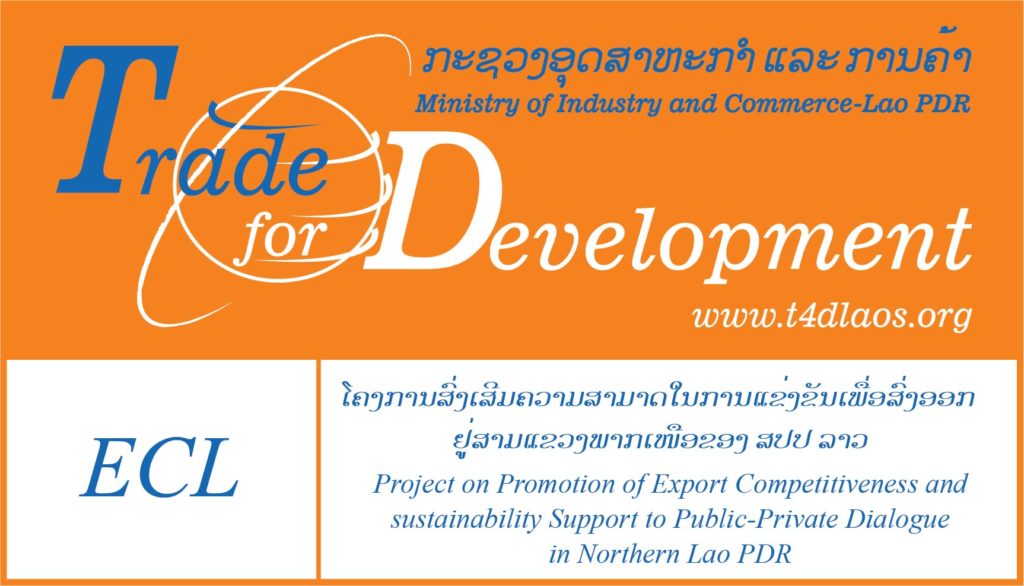EIF Tier II Project
1. ECL at a glance

Project title: Promotion of Export Competitiveness and sustainability support to public-private dialogue in Northern Lao PDR (ECL)
Category of project: Technical assistance and capacity building
Objective:
The project aims to increase investment in and exports of targeted
sectors, leading to sustainably improve incomes of poor households,
particularly women in three Northern provinces of Lao PDR.
Grant recipient: National Implementation Unit, Department of Planning and Cooperation, Ministry of Industry and Commerce, Government of Lao PDR
Implementation
entity Provincial Offices of Industry and Commerce in Luangnamtha,
Oudomxay and Phonsaly Provinces, and Private Sector
Project duration: 3 years
Total project cost: USD 2 million
EIF funding sought: USD 1.8 million (USD 1.5 million from Tier II funding and USD 0.3 million from Sustainability Support)
Other sources of funding: Government in-kind contribution: USD 0.2 million and expertise resources through technical collaboration with Lao PDR Trade and Competitiveness Project: USD 0.4 million
2. Objectives
The project intends to promote private sector-led economic growth in the least developed Northern Region of the country, in a response to the Government’s eight National Socio-Economic Development Plan (NSEDP). The Plan calls for strong and more equitable and sustainable economic growth as one of its three key objectives. Achieving this objective will require diversification of the economy away from natural resource sectors, and a reduction of development gaps between the regions. The project directly supports implementation of two of the government’s three strategic pillars for trade and private sector development, namely: improving the business enabling environment; and enhancing the competitiveness of Lao enterprises.
The project aims to increase investment in and exports of targeted sectors, leading to sustainably improve incomes of poor households, particularly women in three Northern provinces of Lao PDR. This is to be achieved through improving the export competitiveness of the three Northern provinces, with focus on improving the local business environment; removing barriers for starting a business; sustainably institutionalizing public-private dialogue; and enhancing the productivity and export performance of handicrafts and selected agribusinesses (the rice sector in Luangnamtha, maize in Oudomxay, and tea in Phongsaly).
3. Results Statement
The project will deliver on the following results:
1). Result I: Improved local business environment through:
- Simplification of business start-up procedures, including the business registration process, and streamlining priority business operating licenses;
- Institutionalization of regular public-private dialogue to address specific local business environment issues, especially those related to the inconsistent implementation of laws and regulations at local level; support participation and representation of local businesses in local-level policy making and at the National Lao Business Forum; and improve policy making at local level. This results will be funded through EIF sustainability support.
The expected outcome of Result I will be measured, among other things, by a reduction in the time and cost involved in starting a business, an increased number of newly registered Micro, small and medium enterprises (MSMEs), the number of specific issues affecting the operation of businesses in the general manufacturing and services sectors, and improved policy making at local level.
2). Result II: Enhanced productivity and exports of key sectors, namely handicraft, in all three provinces (rice in Luangnamtha, maize in Oudomxay, and tea in Phongsaly), using a value chain development approach.
The expected outcome of Result II will be measured by production outputs, household income and export volume of targeted sectors. It is envisaged that targeted technical assistance will be provided to promote the handicraft sector in all three provinces, and rice in Luangnamtha, maize in Oudomxay, and tea in Phongsaly, for which detailed value chain studies have been carried out under the Mainstreaming Support Facility and other development projects.
Through targeted interventions to reduce the cost of doing business, enhancing the competitiveness of the handicraft sector and raising the efficiency of rice, tea and maize processing agribusiness, the project is expected to sustainably improve the incomes of poor households through new and improved (formal) employment opportunities. Existing and new micro and small and medium-sized businesses (SMEs), and especially women-led businesses, are expected to benefit from lower compliance and operating costs, as well as direct access to sector-specific business development services.
It is envisaged that at least 200 individual households engaged in handicraft production, and the plantation of maize, tea and rice will be supported by the project, and more than 60% of households/individual producers are expected to be led by women.
4. Implementing Arrangement
The project will be implemented as part of an established Aid for Trade Framework. Overall policy direction will be provided by Program Executive Committee (PEC) and implementation progress will be monitored by Project Review Committee.
The National Implementation Unit (NIU) within the MoIC Planning and Cooperation Department is the core technical and fiduciary implementing unit for the project. The NIU will be responsible for coordinating the relevant implementing agencies at provincial level, managing components at the technical level, managing the work planning process, and coordinating progress and financial reporting at project level.
| Title | Description | Size | Date added | Download |
|---|---|---|---|---|
| PROJECT APPRAISAL DOCUMENT (PAD) - LAO PDR COMPETITIVENESS AND TRADE PROJECT | LCT Project | 882.88 KB | 16-05-2019 | DownloadPreview |
| EIF Tier II Project Document | EIF Tier II Project | 5.52 MB | 16-05-2019 | DownloadPreview |
| TDF II - Project Appraisal Document PAD | TDF II Project | 1.83 MB | 16-05-2019 | DownloadPreview |
| TDF I - Trade Development Facility PAD | TDF I Project | 0.98 MB | 16-05-2019 | DownloadPreview |
| EIF Tier I Phase1 Project Document | EIF Tier I Project | 2.24 MB | 16-05-2019 | DownloadPreview |
| EIF Tier I Phase1 Phase II Project Document | EIF Tier I | 1.84 MB | 16-05-2019 | DownloadPreview |